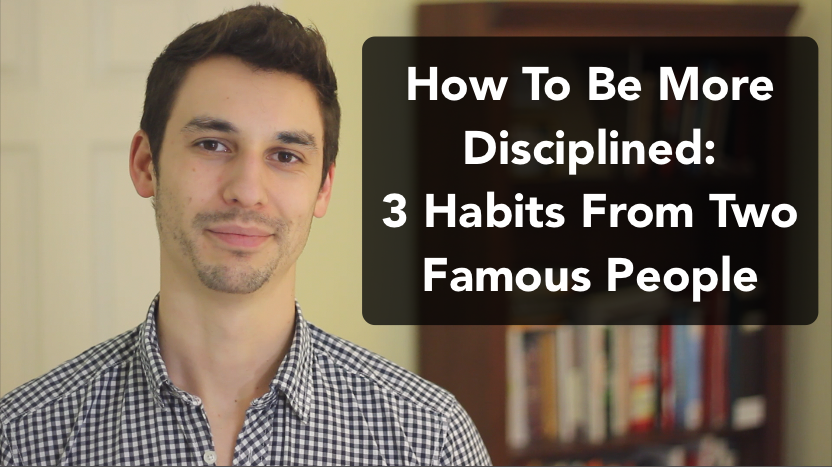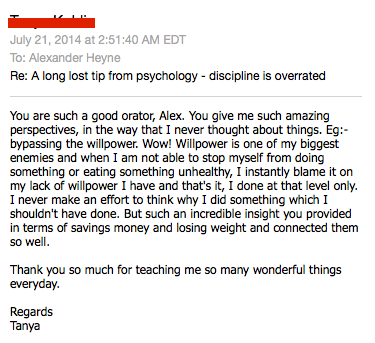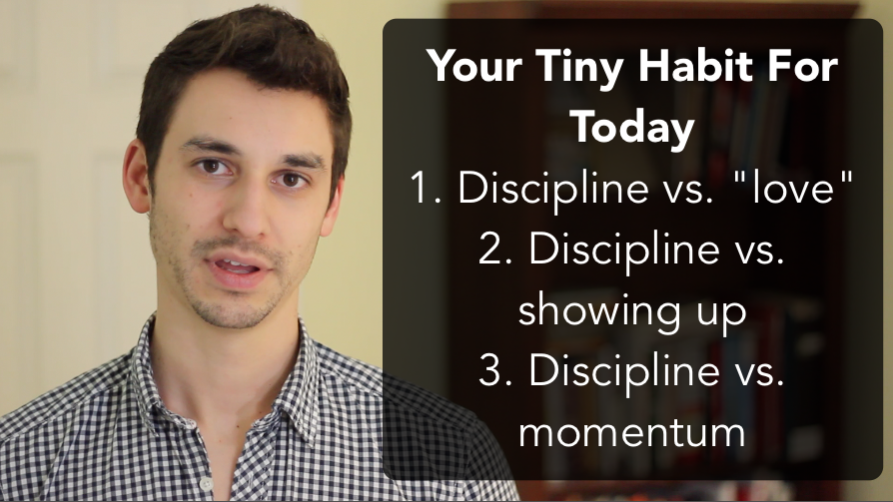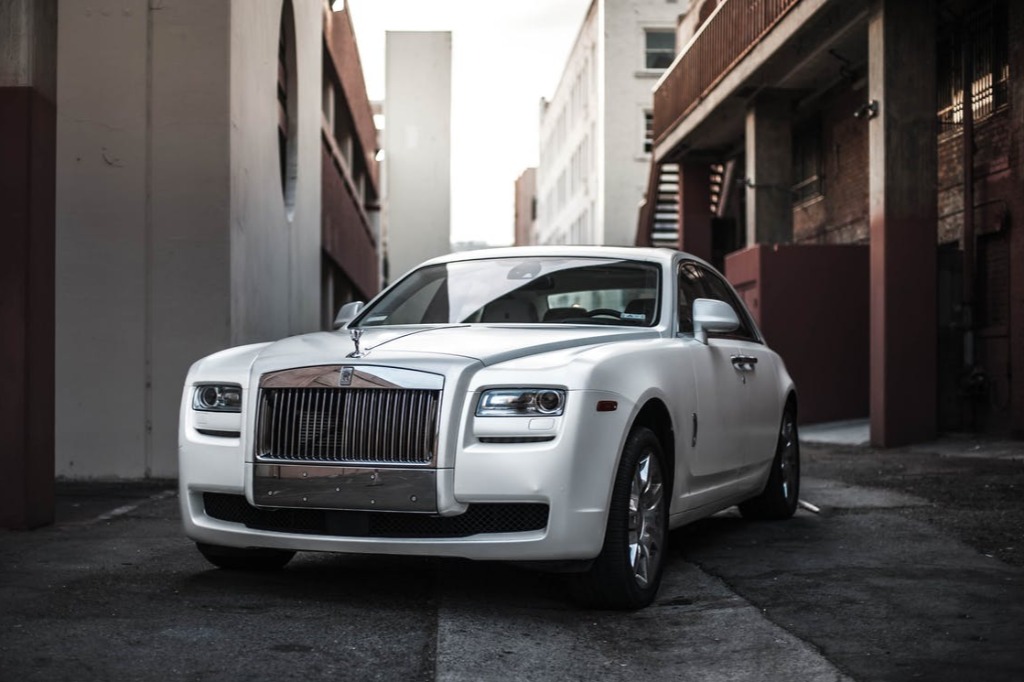
How To Be More Disciplined: The Rolls Royce Creator, Stephen King & Unconventional Advice

When I say “discipline,” what comes to mind?
Agony?
Frustration?
Effort?
Exhaustion?
Something I don’t have?
You’ve heard it before, discipline is the key to success – the solution to all your health and exercise angst is to just force yourself to be more disciplined.
It works, except of course, when it doesn’t work.
When (And Why) Discipline Doesn’t Work
https://youtu.be/LOIAT-uUvZo
The Discipline Myth

I got an email from a reader that went like this:
“… Willpower is one of my biggest enemies when I am not able to stop myself from doing something or eating something unhealthy, I instantly blame it on my lack of willpower I have and that’s it…”
And another reader:
“… So basically, I’m screwed, because I don’t have much discipline or self control.”
After having these two conversations back to back talking about health, I got to thinking: if it were really all about discipline and effort, technically we shouldn’t be able to find too many successful people who weren’t grind-it-out kind of people, right?
If that’s the case, we shouldn’t be able to find that many people who were successful without mentioning the fact that they regularly force themselves to show up every day.
When I looked deeper, I realized that this wasn’t necesarilly true. The three stories may provide some insights into how you can turn 2016 into your healthiest year ever, without en emphasis on struggle, grinding it out, and massive grit.
Three Stories of “Discipline” And Their Counterintuitive Advice
This association – discipline = success | fitness | happiness – is so ingrained in our culture that it’s crazy.
For most of us, there isn’t any other mental model for how to be successful – grind out those workouts, day in and day out, force yourself to eat boring, bland health food. Just suck it up.
We see a successful person and assume they have iron discipline.
We see a fitness model and immediately think that they must be spending all of their free time in the gym, and their life revolves around what they eat, drink, and where they workout.
However, you might be surprised by the truth.
Discipline vs Love: Henry Royce – The Creator of the Rolls Royce
The creator of the rolls royce – Fredrick Henry Royce – was so obsessed with perfection, and creating a design and model that the world had never seen before, that he suffered from malnutrition and a boy was required to follow him around with some milk and bread (source):
“From his earliest successes in the infant electrical industry, which he joined in 1884 aged just 21, to his death in 1933, Royce uncompromisingly pursued his basic principle of establishing the best design, using the finest materials available, worked by the highest levels of craftsmanship. In his own words: “Strive for perfection in everything you do. Take the best that exists and make it better. When it does not exist, design it.”
His “discipline?” Love.
Let me repeat that: this guy created one of the most powerful, successful brands in the world. And nowhere in that story do you hear anything about grinding or suffering – he just talks about sheer passion for his subject, passion that was strong he wouldn’t eat for days.
In fact, his malnutrition from lack of eating (because he was in flow) was so severe that it caused health problems later in his life. Insane.
Discipline vs Showing Up: Stephen King

Surely Stephen King, a supremely creative writer with millions of his books sold, must rely on the muse and creativity.
I’m sure he just sits down when an idea hits him, writes like a fiend, and that’s how books come out.
No, wait, maybe he just goes on vacation and while he’s blissed out on a beach with a Corona, he’s brainstorming a couple things.
Well, here’s a little excerpt from Lisa Rogak’s book, Haunted Heart: The Life and Times of Stephen King:
“I have a glass of water or a cup of tea. There’s a certain time I sit down, from 8:00 to 8:30, somewhere within that half hour every morning,” he explained. “I have my vitamin pill and my music, sit in the same seat, and the papers are all arranged in the same places. The cumulative purpose of doing these things the same way every day seems to be a way of saying to the mind, you’re going to be dreaming soon.”
Wow, that sure looks like focus and discipline, huh?
But do you see Stephen King talking about a forced grind? No doubt there’s discipline involved, but look at the elaborateness of this ritual. The same place. The same vitamin. Music. The papers all in the same spot. It builds a sense of mental momentum that gets him into the groove and gets things started.
His “discipline?” Showing up.
Discipline vs The Momentum Principle
Even though I’m not Stephen King or Henry Royce, there’s a third kind of principle I’ve used to overcome discipline in my own life. Here’s how it goes.
First, the results: I’ve gone to the gym every week, an average of 4 times a week, for almost a decade now.
The only weeks I’ve missed have been the ones where I’ve been on vacation, or sick enough that I had to stay in bed. And, of those days (over a decade) that I’ve gone, I’ve only ever had to force myself a few times.
Here’s what I’ve done that works.
I discovered that Isaac Newton’s law of inertia (an object that’s in motion wants to stay in motion, and an object at rest wants to stay at rest), also applies to our thinking and emotions. In other words, a person who is irrational and emotional will continue to go on while they are being emotional, and when we’re calm, it’s relatively easy to stay calm.
The same applies to the body – if you’re laying on a couch, how much do you really want to get up and go workout?
Workout? Haha, that’s a good one.
However, if you’re walking your dog, and the blood is pumping and you feel good, if I asked you to go for a 15 minute light workout right now, do you think you’d be a little bit more likely to do it? Probably.
I realized that 6pm is the kiss of death for most of us – that’s when we’re getting off of work, we’re tired, and we’re hungry, and we just want to go home. There isn’t a lot of ambition to do much else unless we’re trained.
So I trained myself to maintain that momentum, and while I was still somewhat alert, to go directly to the gym before going home.
To lower the friction, I ate 1 hour before working out (hunger is a big excuse to go home and not workout), I picked a gym on my way home, that wasn’t out of the way more than 1 mile and I kept my gym bag in my trunk at all times.
My “discipline?” the momentum principle. If I go home first, it’ll never happen, even though my gym is 5 minutes from my house. After that, I give myself full permission to do nothing and just collapse on the couch or do whatever I want.
Replacing Your Painful Discipline With Something More Awesome
At a high level, it’s about focusing on how to use the power of tiny habits, systems, and creative routines rather than forcing yourself to do anything.
We’re talking about habits – but to go deeper – a few kinds of habits specifically.
We talked about:
- Love (intrinsic motivation)
- Showing up, routines and rituals
- Momentum
Love? What’s with this this Alex dude, is he insane?
And what does any of this, like writing a book, have to do with losing weight or living better in 2016?
Here’s how to apply these principles.
#1 – The Power of Intrinsic Drivers
 Which is easier: doing 10 minutes of something you enjoy, or 10 minutes of something you hate?
Which is easier: doing 10 minutes of something you enjoy, or 10 minutes of something you hate?
An elementary example, I know, but many of us forget just how powerful this principle really is: the best predictor of whether or not we’ll do anything long term is just a matter of how much we enjoy the process. Hands down, ths is the simplest principle in the world.
So the easiest way to get yourself to get into the habit of exercise, for example, is to avoid anything you hate doing like the plague.
That might mean:
- Yoga, instead of running. Forget which one you think you should do – do which one you want to do.
- For eating, that might mean a green smoothie, instead of eggs every day. Maybe you just like having fruit smoothies.
- Doing weights instead of doing a calisthenic class – personally, cardio makes me want to die, and weight lifting feels like lazy exercise since I’m not huffing and puffing the entire time.
Yeahhh buddy, not hating your life makes life swell.
Where can you lower the friction and apply intrinsic motivation?
#2 – Showing up, routines and rituals
Here’s an idea for how you can get yourself to eat healthier.
Start with a morning ritual that anyone can do: buy plants next time you to go the market, get this nutribullet blender, leave the blender in your refrigerator, and leave the plants inside the blender in your fridge in the proper proportions.
When you wake up, all you have to do to create breakfast is to add water, turn the blender on, and you’ve got a green smoothie. There’s not an excuse in the world for not doing something that simple.
Step #1: Get plants
Step #2: Get smoothie
Step #3: Insert plants into smoothie
Step #4: Leave in refrigerator
Step #5: Consume hurriedly on the commute to work
Voila – easy breakfast.
#3 – Momentum
The momentum principle is simple: schedule activities around your highest energy and momentum.
This might mean walking at lunch when you have the highest energy.
It might mean not doing anything in the morning if you are deathly low on energy.
It might mean meditating for 1 minute while you’re at the office on a quick work break. If you find yourself procrastinating on doing meditation in the morning or evening, lower the effort involved, and while you’re the most awake, crank that baby out.
Make little time buffers in your schedule – if 7-9 am you’re deathly tired, don’t schedule anything health related, since you know the force (of inertia) is strong. But if you know, for example, you’re going to go to home from the gym – maintain the momentum (aka, you’re awake) and keep going.
Replacing Discipline For Good

Listen, there’s no way around it: the more disciplined you are, the better your life will be, and the greater the chance you’ll reach all your goals.
But for those of us who don’t possess much discipline, what are we supposed to do? I’m proposing that there are a couple of different, better ways to go about doing things.
Whether it’s a fitness goal, nutrition goal, or life goal, focus on the things you enjoy, show up with rituals and routines, and utilize the momentum principle.
After all, these are the success principles of some of the greatest people in history – so why not us, too?
Thoughts on this?
-Alex
Have you read my book yet?
Read more about this in my book Master The Day. You’ll learn the nine daily success habits I learned interviewing people that lost 100+ pounds and kept it off in a healthy way – by changing their habits. Plus, you’ll get a free $100 video course if you show me your receipt.
Some images used with permission from Freedigitalphotos.net






Brilliant! Thanks, Alex.
You’re welcome Shannon !
I absolutely agree with what you say. People ask my how I can have a full time job and still want to do it as freelance in my free time. And I say, it’s because I love what I do!. It doesn’t feel like an obligation.
Even for the momentum. I’ve tried it last year and noticed that if i don’t go to the gym right after work (where i would be for 2h without seeing the time pass), I get lazy and don’t want to do it anymore. I find it hard this year because I now carpool so I am trying to create a momentum at home instead. I have a circuit setup so I want to try to forget that I am home for that first hour and make it a good habit. Hope it works. Wish me luck!!
Thanks for the reminding me of that fact!
Spot on Mona! You totally nailed it. Let me know how it goes turning this one into a new habit 🙂
This is brilliant, thanks. I believe it is in sync with the work of Richard St. John’s “Eight to be Great” – arguably the most exhaustive research on what it takes to succeed.
1. Passion (like your number 1) 2.&3. Work and Focus (like your routine) 4. Push (like your maintain momentum) 5. Creativity 6. Continuous Tweeking to Improve 7. Service to Others Motivation and 8.Persist
Tim – that book looks awesome, going to check it out right now!